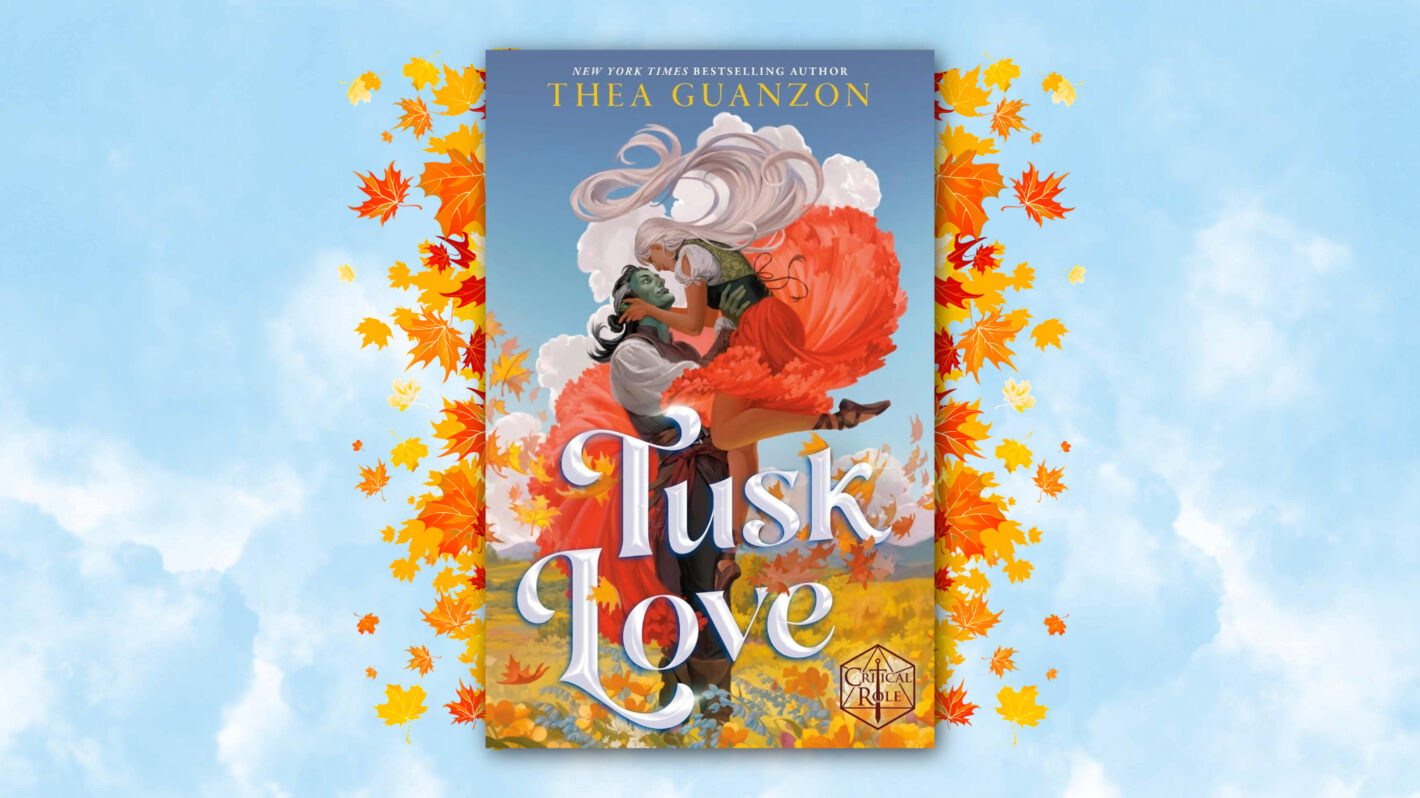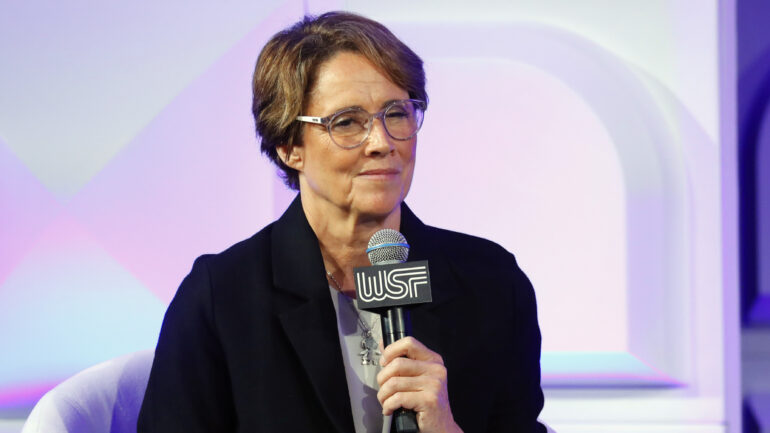Exclusive Interview
Thea Guanzon on Bringing ‘Critical Role’s Guinevere & Oskar Romance to Life in ‘Tusk Love’

In 2018, during the second campaign of the popular web series Critical Role, tiefling Jester Lavorre (played by Laura Bailey) picked up a copy of a smut novel called Tusk Love, starring the daughter of a traveling merchant named Guinevere and her relationship with a half-orc named Oskar. The book became somewhat of a fixture throughout the rest of the campaign—dubbed The Mighty Nein — with Jester becoming infatuated with the book to the point of referring to half-orc Fjord (Travis Willingham), her party companion crush, as the brooding Oskar.
Seven years later, thanks to the massive popularity of Critical Role’s storytelling that has brought the web series to mainstream heights, that book is a reality, brought to life by New York Times bestselling author Thea Guanzon (The Hurricane Wars). Swooon spoke with Guanzon about adapting Oskar and Guinevere’s love story, how her own experiences informed her storytelling, and much more.
What was the hardest and the easiest part of writing this? Because I imagine some of it would come easily in terms of character development and knowing the world of Critical Role, but I imagine there are also some challenges.
Thea Guanzon: So, when you say writing itself, as in the act of committing words to the page or to the Word document, Tusk Love as a whole is probably the easiest thing I have ever written.
Really?
Guanzon: Yeah, all of it just flowed out. I was so inspired. I think because I was playing in the sandbox of the Critical Role universe which is something that I passionately adore. So, I was technically writing fanfic and that’s how I started, as a fanfiction writer.
I did too! AO3?
Guanzon: Oh my god, no. I went way back.
Oh, you went way back, like fanfiction.net.
Guanzon: I was on fanfiction.net. I was even writing drabbles on LiveJournal, all of that.
Same, same, same!
Guanzon: Basically, yeah, I was in essence just going back to my roots, so all the old instincts just kicked in, and I swear it was probably — like in terms of just writing itself, the book practically wrote itself. You know what I mean? But where I had relatively more difficulty was the editing process. Just going back in and making sure that the lore was accurate, that the character development was organic, that the romance was organic. The relationship between Oskar and Guinevere is the central aspect of the book, and it is not a slow burn. I usually only ever do slow burns, but I was commissioned for it, and I did not want to unleash my usual 150,000-word manuscript on an unsuspecting franchise with an existing fan show, so the relationship had to move at a quicker pace than what I’m usually used to writing. I needed to make sure that it still felt authentic and believable despite that. So, yeah, there was a lot of fine-tuning the relationship dynamics as the emotional needs between the two characters, and I can only hope that I have succeeded.
What was your favorite part of the story — or just even something that you were happy or proud to include, even if it was something from your own headcanon?
Guanzon: I think that basically every interaction Oskar and Guinevere had where the “grumpy/sunshine” dynamic came into play. Because “grumpy/sunshine” is one of my favorite tropes ever, so I was just very happy to present my own spin on it and to just do what I really like reading in fiction. I just really love the whole thing about Oskar being this super grumpy, brooding man who slowly but surely opens up to Guinevere who is… like she is sunshine in human form, but she’s also doesn’t know much about the world. But she has the enthusiasm. She doesn’t know what they’re doing but she’s ready.
She’s on board. He’s adorable and grumpy, and she’s like, “You know what? I’m going to make you like me!”
Guanzon: Yes, exactly. I really enjoyed also making her more proactive in their scenes together, putting her a little bit more in charge in a sense because I think that was also an important part of it: Guinevere discovering her own agency and her own sense of independence.
What it was like working alongside with the Critical Role team to get to the finished product?
Guanzon: My agent emailed me at three in the morning asking. She asked, “Hi, Thea. Have you ever heard of Critical Role? Because they want you to write a book for them.” And I swear I screamed so loud. I live in a condo building. My neighbors probably thought that there was a ghost or that someone was getting murdered. So, of course, without even asking what the book was I was like, “Oh my god, yes! What is this?” No, I didn’t even say “What is this?” I just said “Oh my god! Yes!”
Appropriate answer!
Guanzon: And then my agent was like, “Yeah, they’re looking to write Tusk Love,” and at that point I just backflipped into the stratosphere. It was definitely a dream come true for me. Then I had the initial meeting with [Critical Role Lore Keeper] Dani Carr and the rest of the Critical Role team. Before that, they asked me to provide a concept for how I felt the book should go. They basically gave me free rein with what the plot would be, with what the characters would be. All they asked was that I stuck to what had already been laid down as canon in the plot in the web series. So, we started off with the characters being named Oskar and Guinevere and the fact that she was a traveling merchant’s daughter and the fact that they met somewhere near Druvenlode. And then the end scene had to have him carrying her through a field of wildflowers. So, these are things that we know, because Laura Bailey ad-libbed them throughout all of Campaign 2. So, I had to work from those bare bones and sort of think of a plot that could string all of these together.
Do you relate more to Oskar or to Guinevere?
Guanzon: I definitely relate to Guinevere more. Like her, I also grew up a little sheltered, a little cloistered away from the realities of life. I was born in this very small provincial city where everyone knew each other, and I went to Catholic school all my life and high school and college was not only Catholic but also all girls. I also grew up not knowing how to do anything, like not knowing how to do household chores because my parents never expected that of us because, I don’t know, they wanted us to concentrate on our studies, I guess? They’re typical Asian parents, so a lot of what they do and say is a mystery to me. But then I moved to the big city, to metro Manila, and I was living on my own for the first time, and I suddenly had to learn how to do all of these things. I had to learn how to cook, I had to learn how to clean, I had to learn how to wash my clothes, and it was not an easy experience being 20 years old and having to do all of this for the first time. So, I really infused a lot of that personal experience into Genevieve’s own confusion. There’s this scene where she’s having to wash the dishes, and I really felt that in my soul when I was writing it.
I’m curious how your previous work, specifically The Hurricane Wars, informed how you approached Tusk Love in terms of character development or writing. Was there anything you learned from your previous books that helped you in the process or in terms of drafting or pacing?
Guanzon: Actually, it’s funny that you should ask that because when I set out to write Tusk Love, my main goal was to make it as far from The Hurricane Wars as possible. Because I wanted to challenge myself. At the time, I had already been working on The Hurricane Wars series for two or three years, and I just needed a break. So, I set out to write something that was completely different and out of my wheelhouse. The Hurricane Wars was very… here’s a lot of political and court intrigue, there’s a lot of hatred between the main couple, it’s very slow burn as well, so it was nice to write something that was comparatively more lighthearted. I think that if there was one thing I learned, it was how to let characters with completely different personalities bounce off each other, how to develop a relationship through all of those little interactions, and how to develop chemistry through the littlest things, like noticing the smallest details about someone. And also, by the time I wrote Tusk Love, I had already had more practice writing the smut scenes. A main thing in the smut scenes of The Hurricane Wars is that it was also an opportunity to introduce more character development. Because it wasn’t just sex, they’re learning stuff about each other and about themselves through it, so that was also something that I put into Tusk Love. It’s not smut—I want to believe that I made it not smut for smut’s sake, but also this whole process of both Guinevere and Oskar discovering what they really want and unleashing their real, innermost selves, their wilder selves.
I love it. Because I love romance, I love romantasy, and I love fantasy world building. I love all that stuff, and sometimes it gets very overwhelming but when I was reading Tusk Love, it felt very down to earth.
Guanzon: I think that was probably because I wasn’t approaching it as a, how do I say it?
Like a standard romantasy?
Guanzon: Yeah, I wasn’t approaching this as a standard fantasy book that I was bringing into the world, but as I was trying to present it as what someone who actually lives within the world of Exandria would read. What kind of book would be popular in that kind of universe? Tusk Love is probably their version of a modern rom-com.
What do you hope that fans and readers take away after reading Tusk Love?
Guanzon: I hope that Critical Role fans in particular will be able to enjoy the parallels between Oskar and Guinevere and Fjord and Jester that I tried to put there. And I also hope they enjoy all the Easter eggs. Also, when I was writing the action scenes, I intentionally wrote them with a rhythm that would be similar to playing Dungeons and Dragons or other table top games, so I hope that came across. But just generally, I would love for readers, not just the Critical Role fans, to take away that sometimes you just have to follow your heart and damn the consequences because you just have to pursue what makes you truly happy in this life.
You can find Guanzon on X or Instagram and check out more of her work here. Tusk Love releases Tuesday, July 1.






